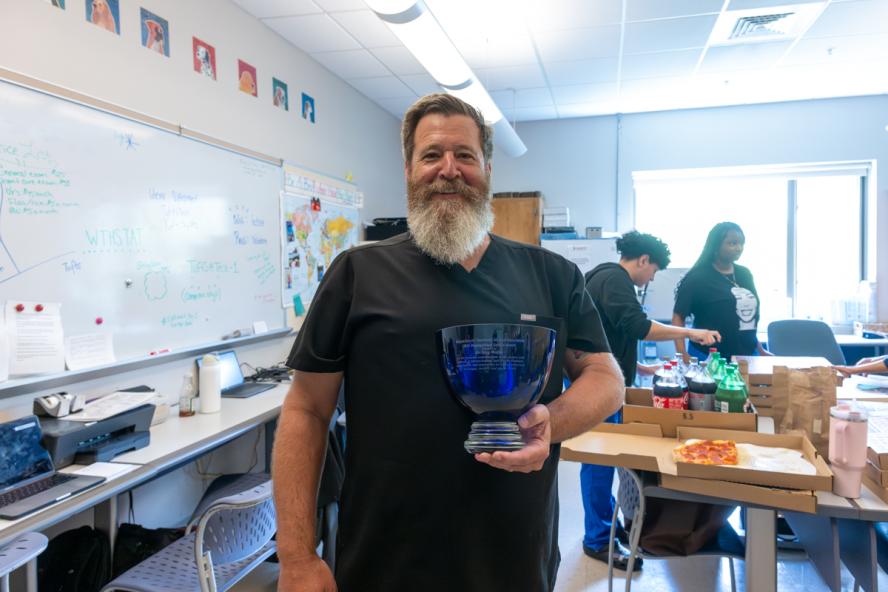When Tufts at Tech opened in the spring of 2012, Wolfus was the sole employee, collaborating with two high school instructors, teaching four high school seniors, and a spattering of veterinary students popping in for elective weeks. By summer, the clinic was already seeing more than 200 cases a month and became a core two-week rotation in the veterinary curriculum.
Serving pets and the community while training high school and veterinary students was the perfect combination for Wolfus. “For me, Tufts at Tech has been a win-win-win, a trifecta of goodness. We all want to find meaning in our work, and that meaning is increased when you’re helping others make a positive impact in communities.”
Following in the footsteps of his mentors, Wolfus passes on the ethos of passionate care to his students. In the early days of the clinic, an unhoused man brought in his dog Patches, his leg broken from a bike crash. Wolfus reached out to assisting agencies. A rescue for poodles, so touched by the owner’s relationship with his dog, paid for the surgery (even though Patches is not a poodle) and a new bike with a basket for Patches to ride more safely. Several years later, the pair returned; this time, Patches was very sick with cancer. Wolfus recalls how the situation challenged students in terms of empathy and understanding another person’s needs.
“Euthanizing Patches was one of the more difficult and meaningful euthanasias in my career,” says Wolfus. “In this community, you get to know these people and their complicated lives. It’s hard not to get emotionally invested and want to help.”
Wolfus instituted ethics rounds at Tufts at Tech every three weeks for students, doctors, and staff to talk through complicated situations they encounter and social and ethical issues.
“Caregiver fatigue and compassion fatigue are part of veterinary medicine,” says Wolfus. “Utilizing kindness, teamwork, communication, and community to build resiliency for future difficult times is critical for this industry. Empowering students to feel like they’re making an impact and helping one another make an impact, that’s what it’s all about.”
In addition to leading Tufts at Tech, Wolfus teaches preclinical and didactic courses at Cummings School, on topics including veterinary ethics, veterinary economics, communication, clinical reasoning, and dentistry. Especially fulfilling for Wolfus is offering guidance to veterinary students as they navigate next steps, whether finding a scholarship, internship, or landing on the specialty that fits their passions.
Today, more than 6,000 patients are treated annually at Tufts at Tech, with four faculty veterinarians, three veterinary technicians, and three veterinary assistants working alongside 12 veterinary students and eight to 10 high school students rotating through. The clinic is at capacity and plans are in the works for what Wolfus calls “Tufts at Tech 2.0,” to quadruple the size of the clinic to serve more pets and provide a more vibrant learning environment for students.
The constant presence of volunteers embodies the spirit of Tufts at Tech. Veterinarians across specialties donate their time to the clinic, in addition to vet techs, and veterinary and high school students. “Anyone mission-driven about wanting to help the animals and the community, I have a place where you can do that,” says Wolfus.
Reflecting on his career, Wolfus expresses gratitude for his mentors, including Labato and Wetmore, college professors, and fellow vets and vet techs. He is grateful to Worcester Tech for their partnership, Massachusetts for supporting students through work skills grants, and former clients who donated to help start Tufts at Tech.
Cummings School has honored Wolfus’s achievements with the Zoetis Distinguished Veterinary Teacher Award, Outstanding Alumni Award, and his induction into the Cummings School Faculty Hall of Fame. Worcester Public Schools recognized Wolfus with the Thomas Jefferson Award for Service.
On receiving MVMA’s Distinguished Service Award, Wolfus says, “I was honored and touched. The doctors, staff, clients, students, and volunteers all make Tufts at Tech successful. I play an integral role in the experience, but this award should be for the ‘we’ rather than the ‘I.’ I’m happy to receive the Distinguished Service Award on behalf of Tufts at Tech.”

